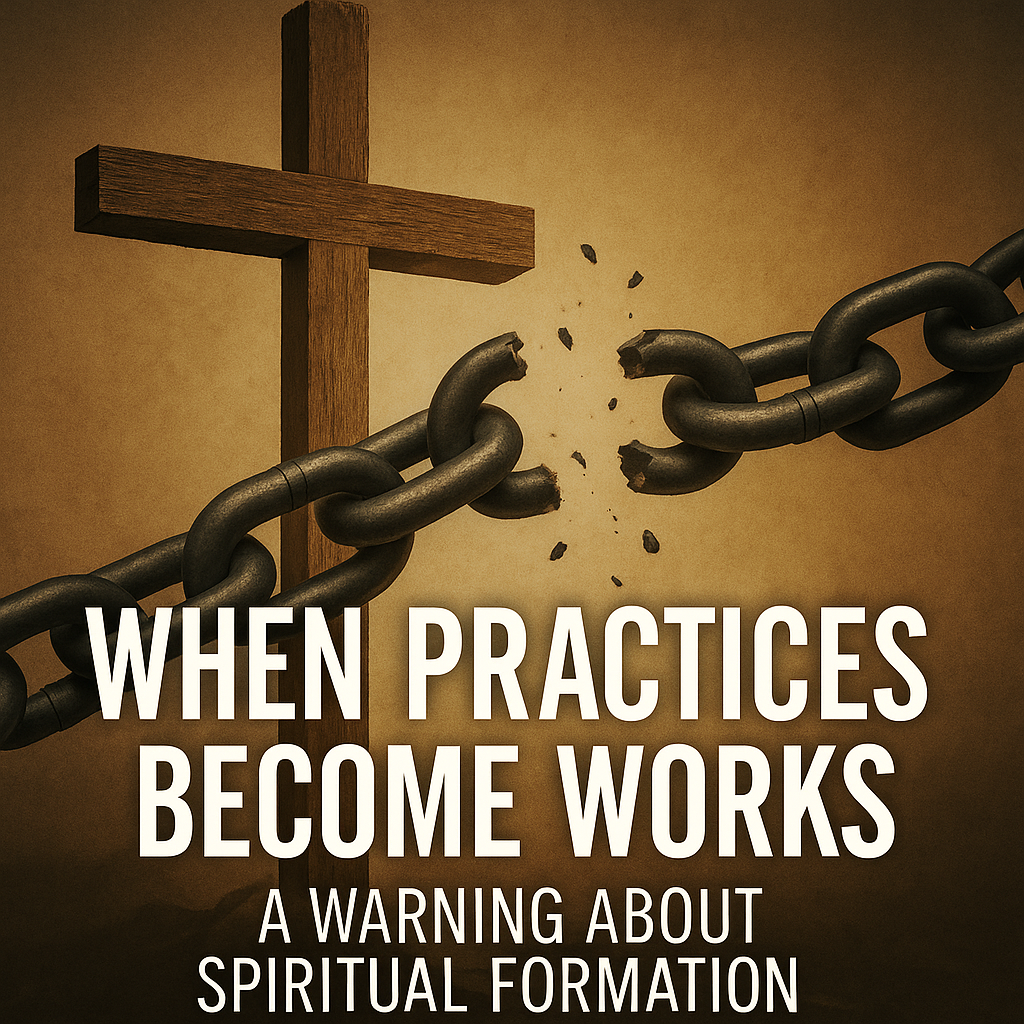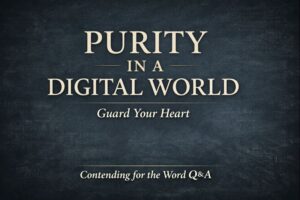⏱️ Estimated Reading Time: 9 min read
When Practices Become Works: A Warning About Spiritual Formation
by Vanessa Hunt
While most people binge-watch shows on their favorite streaming services, I am more likely to find myself binge-watching conversations and debates between people of varying religions. Getting the bulk of my attention lately are dialogues between members of the LDS (Latter-Day Saints) church and biblical Christians. The more encounters I’ve watched, the more I’ve become aware of just how crucial it is to make it very clear to people that Christianity is the only religion that is not grace + works. Sola Gratia or “grace alone” is what sets the true gospel apart from false gospels. We are saved solely by the mercy and grace of the Lord. Which means that anytime we add the word “and or plus” to this equation, we no longer have the assurance of our salvation through the finished work of Christ.
Grace Alone
“For by grace you have been saved through faith. And this is not your own doing; it is the gift of God, not a result of works, so that no one may boast.” (Ephesians 2:8-9)
“But if it is by grace, it is no longer on the basis of works; otherwise grace would no longer be grace.” (Romans 11:6)
“Then they said to him, ‘What must we do, to be doing the works of God?’ Jesus answered them, ‘This is the work of God, that you believe in him whom he has sent.’” (John 6:28-29)
Works Smuggled in as Practices
As I’ve watched these videos, I’ve begun to make a very troubling connection. Sadly, many Christians are also falling prey to the smuggling in of works through the practices of “spiritual formation”. If you don’t know about this movement, I encourage you to please read through the articles at the end of this article. The most prominent voices in this movement assert that we simply can’t experience the highest form of closeness to God unless we incorporate certain practices into our lives. Dallas Willard said, “It is solitude and solitude alone that opens the possibility of a radical relationship to God that can withstand all external events up to and beyond death.” (The Spirit of the Disciplines). While there are definitely benefits to solitude, we would be hard pressed to find any passage of Scripture that would suggest it is through solitude “alone” that we can experience a “radical relationship with God.”
Imagine with me that you are a steel worker who spends his days in a factory. Grueling physical labor and long hours have you just simply thankful for the ride home because at least you get to sit down. You walk through your front door and are greeted by your wife and children who are excited to see you and have needs that you know you are expected to meet. Evenings and weekends are filled with family activities, home upkeep and repairs, coaching your kids’ teams, church and maybe a Bible study group. Now imagine that you are told that a crucial element is missing from your life and it’s keeping you from being able to truly experience, know and hear from God. In fact, it’s the ONLY way you can have a “radical relationship” with Him. You must have solitude and silence. Not just in the fifteen-minute car ride from work to home but long stretches of solitude and silence. Oh, and you should also add in breath/contemplative prayers and Lectio Divinia which, according to spiritual formation leaders, are essential to reaching a higher level of communion with God.
Within this framework, there is a downgrading of prayer as modeled to us by Christ Himself and of the traditional, exegetical way of reading the Bible. Extra-biblical tools and techniques are proffered as a way (THE way) to overcome the seeming insufficiencies and create a system which the Christian must embrace to reach levels which would otherwise remain elusive. This is not to say that we shouldn’t be disciplined in our study of God’s Word and our prayer life. Those are part of the sanctification process of a fully devoted follower of Jesus. Like baptism, they demonstrate that a real inward change has taken place resulting in an outward demonstration of our obedience to Him. But that steel worker has now been told that this simply isn’t enough. And a burden has been placed on him that will only lead him further away from a right relationship with God.
A Heavy Burden
In the book of Galatians we read the account of Paul’s admonishment of the churches allowing the infiltration of false teaching (Galatians 1:8). The Judaizers were insisting that Gentile Christians must be circumcised in order to be saved. Their attempts to require the adherence to specific laws entirely negated the atoning work of Christ on the cross which sets people free from the bondage of the law. We are dead in our sins and made alive through the crucifixion and resurrection of Jesus. This is a gift given to us apart from anything we could ever do. Anyone who suggests that we must do something more than receive this gift of grace must be marked as a false teacher.
“For freedom Christ has set us free; stand firm therefore, and do not submit again to a yoke of slavery. Look: I, Paul, say to you that if you accept circumcision, Christ will be of no advantage to you. I testify again to every man who accepts circumcision that he is obligated to keep the whole law. You are severed from Christ, you who would be justified by the law; you have fallen away from grace. For through the Spirit, by faith, we ourselves eagerly wait for the hope of righteousness. For in Christ Jesus neither circumcision nor uncircumcision counts for anything, but only faith working through love.” (Galatians 5:1–6)
“For the wages of sin is death, but the free gift of God is eternal life in Christ Jesus our Lord.” (Romans 6:23)
In the modern Evangelical church you are unlikely to encounter someone insisting that circumcision is a requirement for salvation. But you will find many who suggest that you need to add certain practices (like with the “spiritual formation” movement) that are no more than repackaged rituals and incantations. They will never refer to them as such and they will never outright say that it’s these practices that earn our salvation. Instead, they will degrade the plain reading of the Bible and the prayers modeled throughout the Old and New Testament and claim that it’s no longer enough to keep them close to God. They will take descriptive passages and make them prescriptive for us today. And they will place a burden on their followers that was already removed on the cross.
Conclusion
Spiritual Formation leaders think that what they are offering is freedom from what they see as restrictive Christianity. They (Dallas Willard, John Mark Comer, etc.) see themselves as “reformers” but not in the vein of Martin Luther the Protestant Reformer. Instead, they promote mystics and an elevation of Eastern practices that they claim have been lost or corrupted by the “Western” church. “Mystics are just those who aren’t content to read books or hear sermons about this glorious reality; they want to experience this love and be transformed by it into people of love. Because it’s here – looking at God, God looking at us, in love – that ‘we are happy,’ that we are most free, content, at rest, at ease, grateful, joy filled, and alive.” (Practicing The Way by John Mark Comer). Popular author, Ruth Haley Barton, trained at the Shalem Institute for Spiritual Formation which teaches that, “This mystical stream [contemplative prayer] is the Western bridge to Far Eastern spirituality … It is no accident that the most active frontier between Christian and Eastern religions today is between contemplative Christian monks and their Eastern equivalents.” —Tilden Edwards, Shalem Founder
The reality is that there is no real freedom to be found in these rites and what they’ve actually returned to has far more in common with the pagans than it does historic Christianity.
The only “practices” you’ll ever need in order to experience the fullness of Christ has been clearly outlined for us in the inspired, inerrant, infallible word of God. Anyone who suggests otherwise is leading you towards what is counterfeit and, essentially, another gospel.
“And when you pray, do not heap up empty phrases as the Gentiles do, for they think that they will be heard for their many words. Do not be like them, for your Father knows what you need before you ask him. Pray then like this:
‘Our Father in heaven, hallowed be your name. Your kingdom come, your will be done, on earth as it is in heaven. Give us this day our daily bread, and forgive us our debts, as we also have forgiven our debtors. And lead us not into temptation, but deliver us from evil.’ (Matthew 6:5–13)
It is more imperative than ever that we exercise discernment as we encounter the movements and teachings that are coming into our churches today. While it can sometimes feel discouraging, especially when we watch people fall prey to the error, it gives us the great opportunity to allow these challenges to strengthen our hunger and love for God’s Word and to “contend for the faith that was once for all delivered to the saints.” (Jude 1:3)
For More On This Topic Please Check Out:
- Servants of Grace — Contemplative Spirituality
- Christian Answers for the New Age — Contemplative Spirituality
- For more from Contending for the Word please visit our page at Servants of Grace or our YouTube.
Vanessa Hunt is a Willamette Valley, Oregon based author and speaker who is passionate about helping women develop a solid Biblical worldview through which they will be better equipped to navigate the culture, workplace, marriage and parenting. She offers encouragement and inspiration on her website At the Picket Fence and in her book, ‘Life in Season: Celebrating the Moments that Fill Your Heart and Home’. Her greatest joys are her husband Robb and their two mostly-grown children. Vanessa and Robb are Outpost Directors for their local Stand to Reason apologetics class. She is a regular contributor to Clear Truth Media and Club31 Women, a division of Baker Publishing. Her work has been featured in Proverbs31 Women, Joyful Life Magazine, Home Front, Good Housekeeping, Better Homes & Gardens and HGTV.




